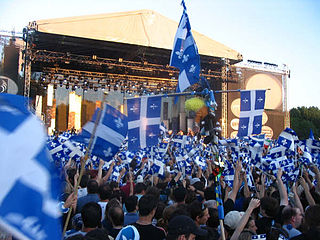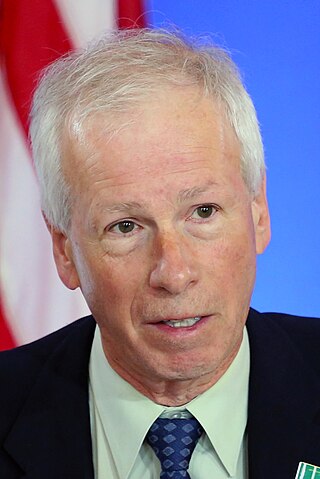Related Research Articles

The prime minister of Canada is the head of government of Canada. Under the Westminster system,the prime minister governs with the confidence of a majority of the elected House of Commons;as such,the prime minister typically sits as a member of Parliament (MP) and leads the largest party or a coalition of parties. The prime minister is "called upon" by the monarch's representative,the governor general,and,as first minister,selects other ministers to form the Cabinet and chairs it. Constitutionally,the Crown exercises executive power on the advice of the Cabinet,which is collectively responsible to the House of Commons.

Joseph Philippe Pierre Yves Elliott Trudeau,also referred to by his initials PET,was a Canadian lawyer and politician who served as the 15th prime minister of Canada from 1968 to 1979 and from 1980 to 1984. He also briefly served as the leader of the Opposition from 1979 to 1980. He served as leader of the Liberal Party of Canada from 1968 to 1984.
The Quiet Revolution was a period of intense socio-political and socio-cultural change in French Canada which started in Quebec after the election of 1960,characterized by the effective secularization of government,the creation of a state-run welfare state (état-providence),as well as realignment of politics into federalist and sovereigntist factions and the eventual election of a pro-sovereignty provincial government in the 1976 election. The Quiet Revolution typically refers to the efforts made by the Liberal government of Jean Lesage and sometimes Robert Bourassa,though given the profound effect of the changes,most provincial governments since the early 1960s have maintained an orientation based on core concepts developed and implemented in that era.

Stephen Joseph Harper is a Canadian politician who served as the 22nd prime minister of Canada from 2006 to 2015. Harper is the first and only prime minister to come from the modern-day Conservative Party of Canada,serving as the party's first leader from 2004 to 2015.

Joseph-Napoléon-Henri Bourassa was a French Canadian political leader and publisher. In 1899,Bourassa was outspoken against the British government's request for Canada to send a militia to fight for Britain in the Second Boer War. Prime Minister Sir Wilfrid Laurier's compromise was to send a volunteer force,but the seeds were sown for future conscription protests during the World Wars of the next half-century. Bourassa unsuccessfully challenged the proposal to build warships to help protect the empire. He led the opposition to conscription during World War I and argued that Canada's interests were not at stake. He opposed Catholic bishops who defended military support of Britain and its allies. Bourassa was an ideological father of French-Canadian nationalism. Bourassa was also a defining force in forging French Canada's attitude to the Canadian Confederation of 1867.

Donald Grant Creighton was a Canadian historian whose major works include The Commercial Empire of the St-Lawrence,1760–1850,a detailed study on the growth of the English merchant class in relation to the St Lawrence River in Canada. His biography of John A. Macdonald,published into two parts between 1952 and 1955,was considered by many Canadian historians as re-establishing biographies as a proper form of historical research in Canada. By the 1960s Creighton began to move towards a more general history of Canada.

Quebec nationalism or Québécois nationalism is a feeling and a political doctrine that prioritizes cultural belonging to,the defence of the interests of,and the recognition of the political legitimacy of the Québécois nation. It has been a movement and a central issue in Quebec politics since the beginning of the 19th century. Québécois nationalism has seen several political,ideological and partisan variations and incarnations over the years.
The Royal Commission on Bilingualism and Biculturalism was a Canadian royal commission established on 19 July 1963,by the government of Prime Minister Lester B. Pearson to "inquire into and report upon the existing state of bilingualism and biculturalism in Canada and to recommend what steps should be taken to develop the Canadian Confederation on the basis of an equal partnership between the two founding races,taking into account the contribution made by the other ethnic groups to the cultural enrichment of Canada and the measures that should be taken to safeguard that contribution".
The 1966 Quebec general election was held on June 5,1966,to elect members of the Legislative Assembly of Quebec,Canada. The Union Nationale (UN),led by Daniel Johnson,Sr,defeated the incumbent Quebec Liberal Party,led by Jean Lesage.
George Ramsay Cook was a Canadian historian and general editor of the Dictionary of Canadian Biography. He was professor of history at the University of Toronto,1958–1968;York University,1969–1996;Visiting Professor of Canadian Studies,Harvard University,1968–69;Visiting Professor,and Yale University,1978–79 and 1997. Through his championing of so-called "limited identities",Cook contributed to the rise of the New Social History,which uses "class,gender and ethnicity" as its three main categories of analysis. Cook's conception of "limited identities" was famously formulated in an article in the International Journal in 1967,Canada's centenary year,reviewing the state of contemporary scholarship on Canadian nationalism:
After six new books on the great Canadian problem —our lack of unity and identity —are we getting any nearer the source of the problem? Undoubtedly something is achieved:if nothing else one can wonder if the search is worth the effort. Certainly we should continue to try to understand ourselves;an unexamined nation is not worth living in. But it may be that the frame of reference is wrong. Perhaps instead of constantly deploring our lack of identity,we should attempt to understand and explain the regional,ethnic and class identities that we do have. It might just be that it is in these limited identities that "Canadianism" is found,and that except for our over-heated nationalist intellectuals,Canadians find this situation quite satisfactory.

Stéphane Maurice Dion is a Canadian diplomat,academic and former politician who has been the Canadian ambassador to France and Monaco since 2022 and special envoy to the European Union since 2017. Dion was Leader of the Opposition and the leader of the Liberal Party from 2006 to 2008. He served in cabinets as intergovernmental affairs minister (1996–2003),environment minister (2003–2006),and foreign affairs minister (2015–2017).
Regionalism is a political ideology that seeks to increase the political power,influence and self-determination of the people of one or more subnational regions. It focuses on the "development of a political or social system based on one or more" regions and/or the national,normative or economic interests of a specific region,group of regions or another subnational entity,gaining strength from or aiming to strengthen the "consciousness of and loyalty to a distinct region with a homogeneous population",similarly to nationalism. More specifically,"regionalism refers to three distinct elements:movements demanding territorial autonomy within unitary states;the organization of the central state on a regional basis for the delivery of its policies including regional development policies;political decentralization and regional autonomy".

Canadian nationalism seeks to promote the unity,independence,and well-being of Canada and the Canadian people. Canadian nationalism has been a significant political force since the 19th century and has typically manifested itself as seeking to advance Canada's independence from influence of the United Kingdom and the United States. Since the 1960s,most proponents of Canadian nationalism have advocated a civic nationalism due to Canada's cultural diversity that specifically has sought to equalize citizenship,especially for Québécois and French-speaking Canadians,who historically faced cultural and economic discrimination and assimilationist pressure from English Canadian-dominated governments. Canadian nationalism became an important issue during the 1988 Canadian general election that focused on the then-proposed Canada–United States Free Trade Agreement,with Canadian nationalists opposing the agreement –saying that the agreement would lead to inevitable complete assimilation and domination of Canada by the United States. During the 1995 Quebec referendum on sovereignty that sought to determine whether Quebec would become a sovereign state or whether it would remain in Canada,Canadian nationalists and federalists supported the "no" side while Quebec nationalists largely supported the "yes" side,resulting in a razor-thin majority in favour of the "no" side that supported Quebec remaining in Canada.

Benoît Pelletier is lawyer,academic,and politician in the Canadian province of Quebec. He was a Liberal member of the National Assembly of Quebec from 1998 to 2008 and was a prominent cabinet minister in the government of Jean Charest. He is best known for promoting the concept of "asymmetric federalism" to incorporate Quebec nationalism into a decentralized Canadian federal structure.
The French term pure laine,refers to Québécois people of French-Canadian ancestry,especially those descended from the original settlers of New France who arrived during the 17th and 18th centuries. Terms with a similar meaning include de souche and old stock as in "Old Stock Canadians".

Joseph-Edmond-AndréLaurendeau was a journalist,politician,co-chair of the Royal Commission on Bilingualism and Biculturalism,and playwright in Quebec,Canada. He is usually referred to as AndréLaurendeau. He was active in Québécois life,in various spheres and capacities,for three decades. Laurendeau's career also "spanned the most turbulent periods in the history of Canada".
Marcel Martel is a Canadian historian. He currently holds the Avie Bennett Historica Chair in Canadian History at York University.

Polyethnicity,also known as pluri-ethnicity or multi-ethnicity,refers to specific cultural phenomena that are characterized by social proximity and mutual interaction of people from different ethnic backgrounds,within a country or other specific geographic region.
Quebecers or Quebeckers are people associated with Quebec. The term is most often used in reference to descendants of the French settlers in Quebec but it can also be used to describe people of any ethnicity who live in the province.
References
- 1 2 "Alumni". Graduate Program in History. Toronto: York University. Retrieved 6 July 2020.
- ↑ Behiels, Michael D. (1978). Prelude to Quebec's "Quiet Revolution": The Re-emergence of Liberalism and the Rise of Neo-Nationalism, 1940–1960 (PhD thesis). Toronto: York University. OCLC 81236533.
- ↑ Behiels, Michael D. (1994). "Review of The Passionate Debate: The Social and Political Ideas of Quebec Nationalism 1920–45, by Michael Oliver". Labour / Le Travail. 33: 311. doi:10.2307/25143802. ISSN 1911-4842. JSTOR 25143802.
- ↑ Michael D. Behiels, "Stephen Harper's Rise to Power: Will His 'New' Conservative Party Become Canada's 'Natural Governing Party' of the Twenty-First Century?," American Review of Canadian Studies Vol. 40, No. 1, March 2010, 118–145
- ↑ "Class of 2011: List of New Fellows" (PDF). Royal Society of Canada. Archived from the original (PDF) on 2012-01-26.